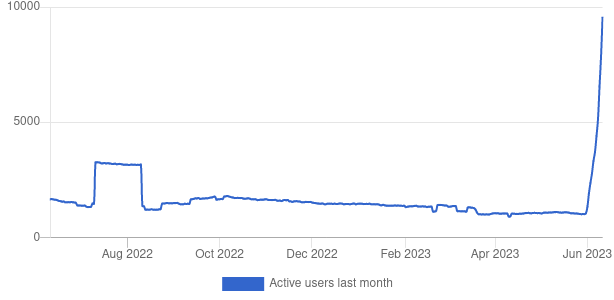you're welcome!
rysiek
Blocking a somewhat fluctuating list of 25k+ instances is still considerably harder than blocking a pretty stable infrastructure of a single major social media platform.
I still think that fedi will help, and in fact I am pretty sure it is helping already, simply because it is quite decentralized. Blocking 20k+ instances is not trivial. And each of these instances is an entrypoint, so to speak, into the broader fedi. Missing even one is thus a big deal. If my instance is blocked, I can set up an account on a different one, follow the same people, and I am back in business.
At the same time all these instances are run independently. One can't simply threaten the whole fedi to force it to do a thing (say, take down an account), this just does not make sense.
Compare and contrast with centralized services like Facebook, gatekeepers like Cloudflare, and so on. Threatening one big entity with problems might be enough to "convince it" to take a thing down.
The reason governments and other powerful entities are able to control the information flow is because there are these hugely important single points of failure. Fedi is not perfect (mastodon.social is way too big for its own good…), but it is a step in the right direction.
HAproxy cannot serve static files directly. You need a webserver behind it for that.
Apache is slow.
Nginx is both a capable, fast reverse-proxy, and a capable, fast webserver. It can do everything HAproxy does, and what Apache does, and more.
I am not saying it is absolutely best for every use-case, but this flexibility is a large part of why I use it in my infra (nad have been using it for a decade).
What absolute bull. 🤦
fixed again. jeebus.
Updated with a new link from EBU.
I think throwing around vague but scary-sounding terms like "compromised" is a very bad idea.
I can certainly tell you that Lemmy wont blindly follow what Mastodon is doing.
Good to hear.
They arent doing a good job for the Fediverse, for example they make zero effort to improve compatibility with other projects. Instead others are left to reverse engineer their federation logic.
Yeah. Plus, the sheer size of mastodon.social and the monoculture of Mastodon-based instances is just unhealthy. I wrote about it at length.
This Tech Won't Save Us podcast episode makes a very important point: any movement that does not have a structure and some form of leadership can easily be taken over by anyone willing and able to fill that kind of power vacuum.
Fediverse currently does not have a structure nor a form of leadership other than perhaps "whatever Mastodon is doing". That's problematic. I hope that we recognize this and do something to fix it, before that power vacuum gets filled by… someone we might not like.
I do see that the researchers involved in the OP link are Erin Kissane and Darius Kazemi. That's fantastic. They are truly fedi old guard, deeply engaged, very knowledgeable, and generally wonderful human beings.




thanks, I should have provided that link.